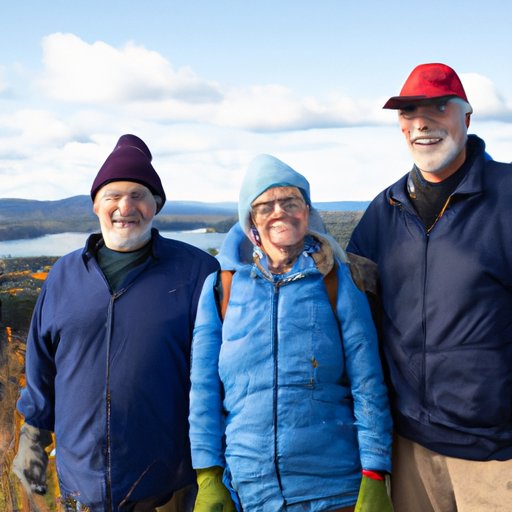Introduction
Have you ever been told that you’re “over the hill”? It’s a phrase that has been around for generations, and it implies that at a certain age, we are no longer capable of achieving anything meaningful. In this article, we will debunk the mythic age limit of being over the hill and provide tips on how to embrace aging with confidence.
Defining “Over the Hill”: Debunking the Mythic Age Limit
The concept of being “over the hill” is often associated with reaching a certain age, typically around 40 or 50 years old. However, there is no scientific evidence to support this claim. Age is just a number and should not be used to measure an individual’s abilities or potential.
Breaking the Age Barrier: Why “Over the Hill” is a Dated Concept
The idea of an age limit comes from a time where people had a shorter life expectancy and could expect to retire and live a few years of a slower pace afterward. Today, lifespans are much longer, and people are continuing to live vibrant lives well into their 70s, 80s, and beyond. Holding ourselves or others to an age limit can have a negative impact on self-esteem and vitality.
Breaking the age barrier means challenging social conventions of aging and embracing the idea that life can be just as rewarding at any age. There are many examples of people who have accomplished great things later in life, proving that age is just a number. For instance, Colonel Sanders launched KFC when he was 62, and Vera Wang didn’t start her fashion career until she was 40.
Beyond the Hill: Celebrating Life’s Second Act
The second act of life can be an opportunity for personal growth and fulfillment. Instead of measuring aging in terms of age, we can measure it in terms of accomplishments, experiences, and impact. There are many alternative ways of measuring aging that reflect the diverse paths that people take in life.
The benefits of embracing your life’s second act with open arms include rediscovering your sense of purpose, building strong social connections, and enjoying life to the fullest. Instead of viewing aging as a challenge, seniors can view it as an opportunity to do what they’ve always wanted to do and live life to the fullest.
Aging Gracefully: How to Embrace Your Golden Years with Confidence
As we age, taking care of our physical and mental health is essential for healthy and happy aging. One way to promote healthy aging is through exercise. Staying physically active can improve heart health, balance, and flexibility, among other benefits. Senior centers and community groups offer many options for seniors to stay active and engaged with their communities.
Coping strategies can also help seniors address different challenges they may face, such as social isolation or cognitive changes. Engaging in activities that promote brain health, such as learning new skills or solving puzzles, can help keep the mind sharp. Professional counseling or talk therapy can also help seniors work through feelings of loneliness or anxiety.
Finally, it’s essential for seniors to enjoy their golden years with confidence by staying engaged with their passions and pursuing their hobbies and interests. This can include volunteering, traveling, or taking up new hobbies that they’ve always wanted to try.
The Beauty of Getting Older: Why Age is Just a Number
While aging does come with some challenges, there are many joys that come with getting older. Seniors are living active and healthy lifestyles, often finding new interests and hobbies to fuel their passions. Accepting and embracing oneself fully as they age is an essential part of finding happiness in the later years of life. Instead of focusing on age, seniors can find happiness and purpose outside of age norms.
Aging: From Stigma to Celebration
Aging has often been stigmatized in our culture as something to be feared and avoided. However, there is a shift in the conversation around aging from a stigma to a celebration. Many organizations are working to remove the stigma attached to aging and promote positive attitudes towards seniors.
Examples of how society is changing its view of aging include online communities that connect seniors with each other and intergenerational efforts to bring older and younger generations together. These efforts change the conversation of aging and work to counter the negative stereotypes that have long been associated with it.
Thriving in the Second Half of Life: Reimagining What it Means to Grow Older
The benefits of embracing the second half of one’s life are many, including discovering new talents and forging new connections with others. However, challenges are undoubtedly present. Some seniors may struggle with health issues, financial difficulties, or other challenges that come with living a long life.
To thrive in the second half of life, seniors need to reimagine what aging means to them and find ways to overcome obstacles. Professional support, such as life coaching or counseling, can help seniors gain the skills they need to live fulfilling lives in their golden years. Additionally, seniors should view their lives as ever-evolving and seek out new opportunities for growth and self-discovery.
Conclusion
In summary, age is just a number, and the concept of being “over the hill” is dated. Instead of measuring aging in terms of age, we should measure it in terms of experiences, accomplishments, and impact. Seniors can stay healthy and age gracefully by staying active, engaging in activities that promote brain health, and enjoying their hobbies and passions. Lastly, we should embrace our golden years with confidence and inspire others to do the same.
